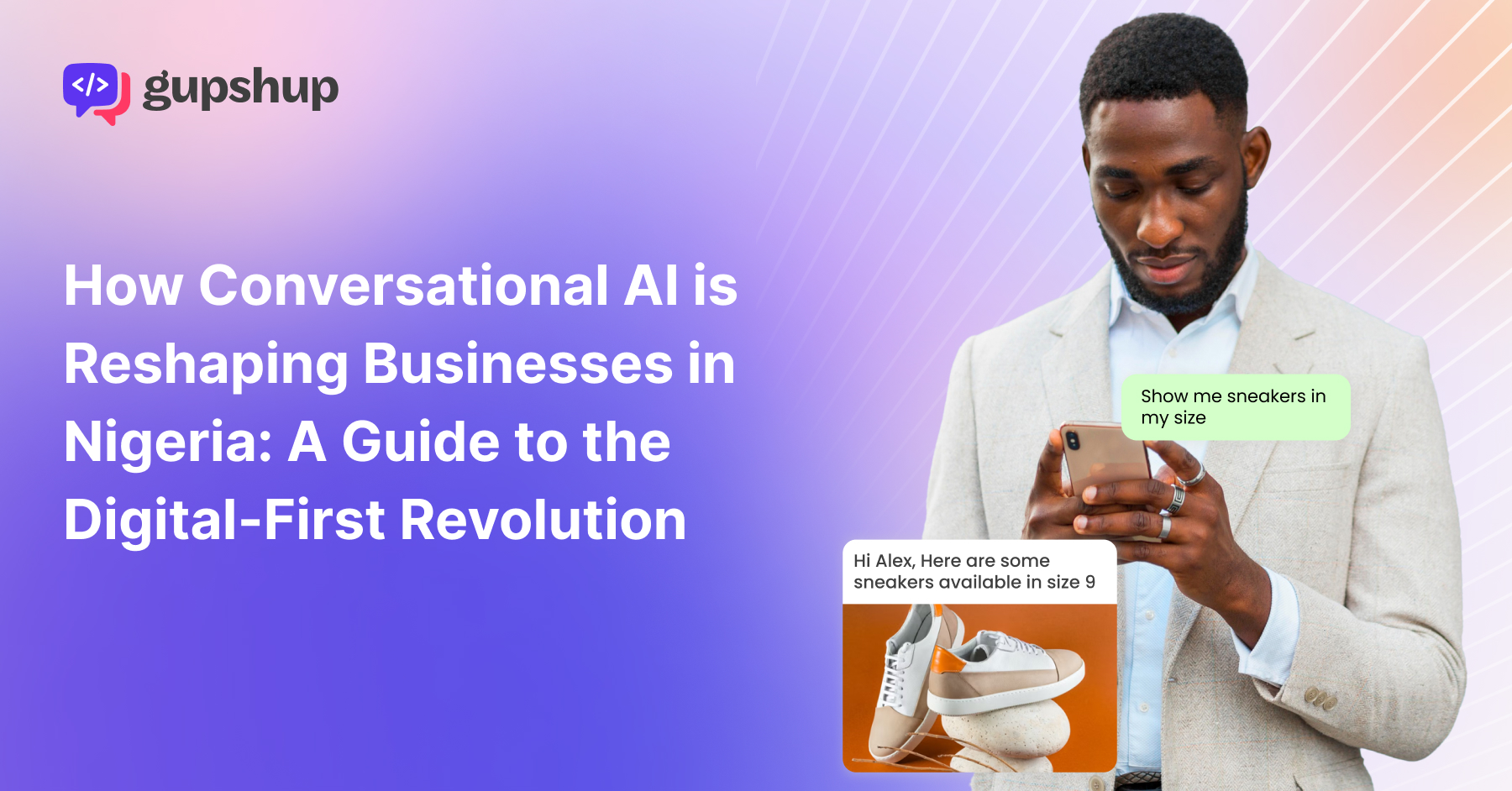How Conversational AI is Reshaping Businesses in Nigeria: A Guide to the Digital-First Revolution

What is driving businesses in Nigeria towards a digital-first future?
Answer: adoption of conversational AI.
Conversational AI is proving to be a pivotal element in the new era of customer interaction.
In Nigeria, the adoption of this technology is on the rise, signaling a transformative shift in how businesses engage with customers. This innovative technology is revolutionizing customer service by enhancing interactions, streamlining operations, and driving innovation.
For modern businesses, integrating conversational AI in their marketing strategy can enable more efficient, personalized, and innovative customer service solutions.
As more businesses in Nigeria embrace AI, the potential for economic growth and technological advancement in the region becomes immense. This marks a significant milestone in Nigeria’s digital evolution.
Let’s explore the different sectors of the business landscape in Nigeria where this technology can be integrated and how Nigeria can grow digitally!
The Nigerian Context: A Landscape Ripe for Innovation

Nigeria’s vibrant, tech-savvy population and its increasing mobile and internet penetration rates make it a fertile ground for the adoption of Conversational AI.
Over 222.5 million Nigerians own mobile phones, and the growing significance of apps like WhatsApp creates a unique opportunity for businesses to engage with customers on their preferred platforms.
From the bustling streets of Lagos to the serene landscapes of Abuja, the demand for quick, efficient customer service is universal, a need that Conversational AI is well-equipped to meet.
Additionally, the global impact of Generative AI on customer conversations across industries is undeniable. The evolution of Large Language Models (LLMs) has significantly improved the accuracy and reliability of AI-driven customer interactions, reducing errors and hallucinations that were once common in early AI implementations.
Today’s LLMs are better equipped to navigate the complexities of human language, ensuring that AI-driven customer service is not only responsive but also more aligned with factual accuracy and contextual relevance.
This leap forward in AI technology underscores a shift towards more sophisticated and trustworthy AI applications in customer service, setting a new standard for global industries and positioning Nigeria as a frontrunner in embracing these innovative solutions.
Transforming Customer Experiences across Sectors

Incorporating Conversational AI into different industries not only enhances customer service and operational efficiency but also fosters a more inclusive and personalized approach to customer engagement.
One platform that can seamlessly support businesses in Nigeria in achieving these advancements is Gupshup. Their sophisticated yet subtle integration within various industries demonstrates the versatility and effectiveness of Conversational AI in driving the digital-first revolution in countries like Nigeria. It has proven to be crucial for businesses aiming to stay ahead in the era of digital transformation.
Banking
In the banking sector in Nigeria, Conversational AI has been a game-changer.
With its introduction, banks now provide 24/7 support, enabling customers to manage accounts, check balances, transfer funds, and pay bills via chatbots. This technology significantly enhances user experience by offering convenience and immediate assistance.
Reflecting its growing importance, the BFSI sector’s chatbot market was valued at $600 million in 2021, with projections suggesting a surge to $5-7 billion by 2030.
Chatbots also promise substantial cost savings, potentially reducing human resource expenses by $11 billion and saving customers’ time. Currently, 25% of Nigeria’s commercial banks deploy chatbots, enhancing accessibility and efficiency in customer banking services.
Moreover, the incorporation of chatbots that operate in local languages extends the reach of financial services to a broader audience, ensuring inclusivity and accessibility. This feature is particularly beneficial for users in remote or underserved areas, who may not have easy access to physical bank branches or are more comfortable conducting transactions in their native language.
This shift not only meets the demand for digital banking solutions but also positions Nigerian banks at the forefront of adopting transformative AI technologies in response to evolving customer preferences and policy changes.
Retail and E-commerce
Nigeria is considered one of the biggest internet economies in Africa.
The retail and e-commerce landscape in Nigeria is witnessing a revolution thanks to Conversational AI.
Chatbots are now essential in offering personalized shopping experiences and streamlining post-purchase processes like order tracking and returns, enhancing customer satisfaction.
The e-commerce market witnessed considerable growth, with projections indicating an increase from $6.2 billion in revenue at the end of 2022 to $14.1 billion by 2027, alongside an expected rise in the user base to 143.9 million by 2027.
Despite a noticeable decrease in Facebook’s ad reach in Nigeria, the digital audience across platforms like YouTube and Instagram continues to grow, reflecting the evolving digital consumer landscape
The integration of platforms such as Gupshup could further enrich customer engagement, offering businesses advanced tools for deploying multilingual chatbots, thus broadening their reach and meeting the dynamic needs of Nigeria’s digital-savvy population.
Healthcare
The integration of Conversational AI in Nigerian healthcare is significantly enhancing the accessibility and efficiency of medical services.
These AI-powered virtual assistants are instrumental in providing immediate responses to patient inquiries regarding symptoms, and medications, and scheduling appointments. By automating high-volume administrative tasks, they reduce wait times and direct patients to appropriate medical professionals, facilitating early diagnosis and preventive care.
Moreover, on the patient side, Conversational AI offers a wide range of services, from automated appointment scheduling to personalized health coaching and chronic disease management, thereby improving patient care outcomes across the board.
Despite the immense potential, the implementation of Conversational AI in healthcare faces challenges such as data privacy concerns, integration difficulties with existing healthcare IT, and the need for substantial investment in technology and training
Nonetheless, the benefits, including increased productivity, lower costs, 24/7 availability for patients, and enhanced quality of care, are driving its adoption in Nigeria’s healthcare sector.
As Conversational AI continues to evolve, it holds the promise of transforming healthcare delivery by making it more personalized, accessible, and efficient.
Hospitality
In the hospitality sector in Nigeria, Conversational AI is redefining the way hotels and travel businesses interact with guests.
By utilizing chatbots, these businesses can significantly improve customer service by offering 24/7 assistance for room booking, answering FAQs, and providing recommendations for local attractions, thereby enhancing the overall guest experience.
These AI-driven tools, powered by Natural Language Processing (NLP) and Machine Learning (ML), enable interactions in natural language, making interactions more personalized and efficient.
Benefits include improved guest experience, increased efficiency, cost savings, and increased revenue through upselling and cross-selling services. Conversational AI also enables personalized recommendations and online brand management by analyzing customer data and feedback.
The integration of Conversational AI in the hospitality industry not only streamlines operations but also helps in building stronger connections with guests, offering them a seamless and more engaging experience.
Benefits and Challenges: A Balanced Perspective
The integration of Conversational AI into businesses in Nigeria has opened up a world of possibilities, driving efficiency, enhancing customer experiences, and providing insights that were previously out of reach. However, as with any technological advancement, the deployment of Conversational AI comes with its own set of challenges and considerations.
Benefits
- Improved Customer Satisfaction: One of the most immediate benefits of Conversational AI is its ability to offer 24/7 assistance. Unlike human operators, chatbots and virtual assistants are available round the clock, providing quick and personalized interactions. This constant availability significantly reduces response times, promptly addressing customer queries, which leads to higher customer satisfaction.
- Increased Operational Efficiency: Conversational AI enables businesses to allocate their human resources to more complex and strategic activities by automating routine tasks. This shift not only reduces operational costs but also improves the overall efficiency of the business. Automating repetitive inquiries and transactions ensures that services are delivered more swiftly and accurately, enhancing the business’s productivity.
- Enhanced Data-Driven Decision Making: Conversational AI tools are capable of analyzing vast amounts of data from customer interactions. This analysis gives businesses valuable insights into customer behavior, preferences, and feedback. Armed with this information, companies can make informed, data-driven decisions that align with customer needs and market trends, ultimately refining their business strategies for better outcomes.
Challenges and Considerations
Despite these benefits, the adoption of Conversational AI is not without challenges. Addressing these concerns is crucial for businesses to fully leverage the advantages of this technology.
- Ethical Considerations: The deployment of AI technologies raises important ethical questions, especially regarding bias and transparency. It is vital to ensure that AI systems are designed and trained in a way that avoids discrimination against any group of users. Maintaining ethical AI practices is essential not only for ethical reasons but also for sustaining customer trust and loyalty.
- Data Privacy Concerns: With the increasing use of digital technologies, data privacy has become a paramount concern for consumers. Conversational AI systems often handle sensitive personal information, making it imperative for businesses to employ secure data-handling practices. Adhering to privacy regulations and ensuring the confidentiality and integrity of user data is crucial to complying with legal standards and maintaining customer trust.
- Human Oversight and Integration: While AI can automate many tasks, human oversight remains indispensable to monitor and refine AI performance. Ensuring that AI systems function correctly and address more complex customer needs or complaints requires human intervention. Additionally, for Conversational AI to be effective, it must be seamlessly integrated into existing business workflows. This integration ensures that the AI systems enhance rather than disrupt the customer experience and business operations.
The Future of Conversational AI in Nigeria
As businesses across various sectors integrate Conversational AI into their operations, we’re on the brink of a digital-first revolution that’s set to redefine customer service, operational efficiency, and personalized engagement.
The fusion of Generative AI and Conversational AI is taking us into a new era of creativity, personalization, and efficiency across industries.
Nigeria’s National Information Technology Development Agency (NITDA) is laying the groundwork for a National Artificial Intelligence Policy (NAIP), emphasizing the need for robust security measures against AI-driven attacks and the integration of AI into various sectors. This strategic initiative aims to leverage AI for sustainable development, bolster national productivity, and enhance human welfare, thus positioning Nigeria at the forefront of the digital revolution.
As Nigeria embraces this transformative technology, businesses looking to lead in the digital age should consider partnering with platforms like Gupshup, which offers advanced tools for deploying Conversational AI solutions.
Businesses in Nigeira, with Gupshup’s capabilities, can enhance their customer service, tap into new efficiencies, and foster a more personalized and engaging customer experience.




